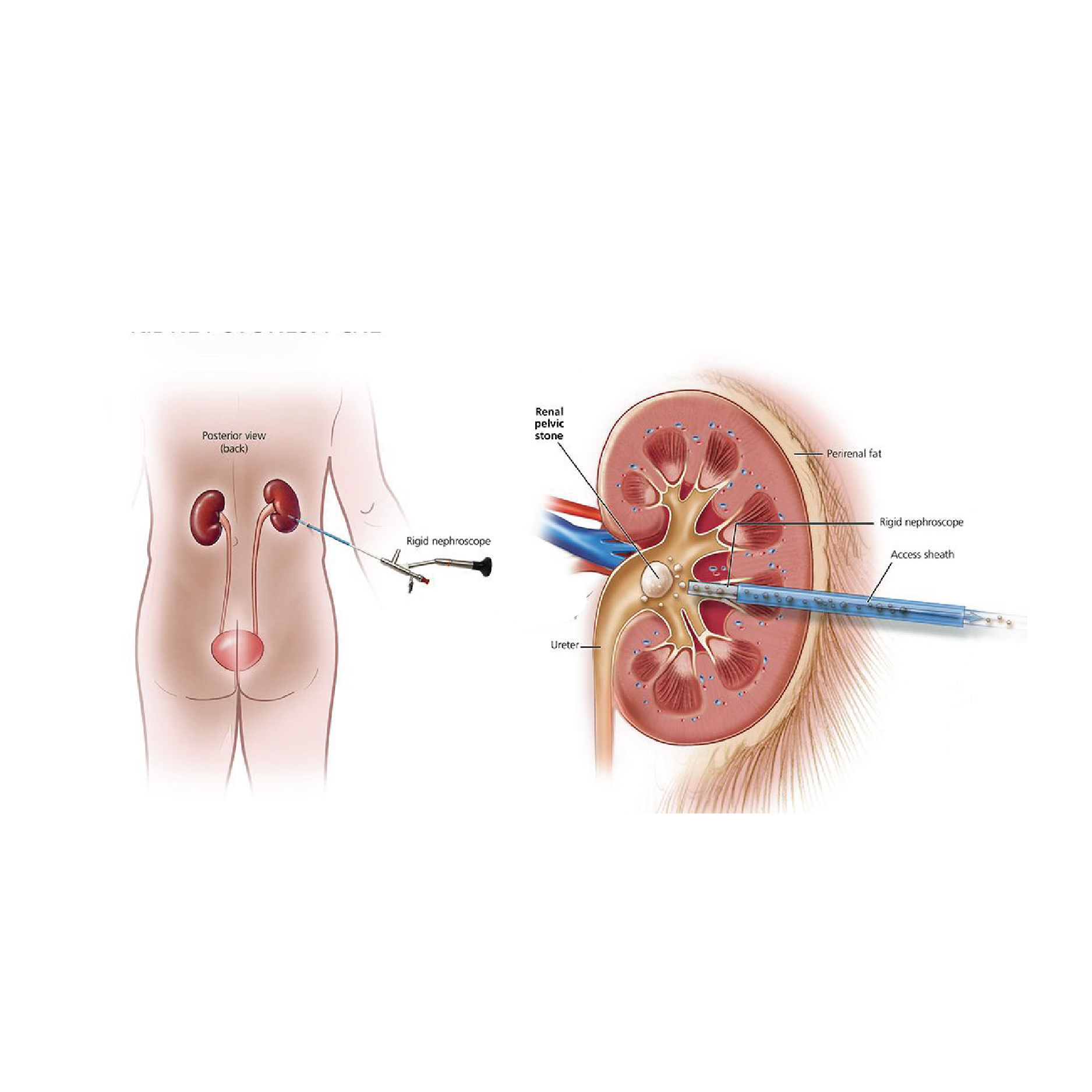RIRS Kidney Stone Treatment in Agra | Laser Surgery by Dr. Shwetank Prakash
Call Us when you Need Help!
RIRS (Retrograde Intrarenal Surgery): Procedure, Benefits, and Recovery
Retrograde Intrarenal Surgery (RIRS) is a minimally invasive procedure used to treat kidney stones and certain urinary tract conditions. It involves using a flexible ureteroscope to access the kidney through the natural urinary passage, eliminating the need for incisions. Laser lithotripsy is then used to break stones into small fragments, which are either removed or naturally expelled through urine.

Understanding RIRS
RIRS is performed using an endoscopic approach, meaning it does not require cuts or incisions. Instead, a thin, flexible scope is inserted through the urethra, bladder, and ureter into the kidney to target and treat kidney stones. Holmium laser technology is used to fragment stones, making them easier to pass.
Who Needs RIRS?
RIRS is recommended for patients with:
- Kidney stones larger than 1.5 cm that are difficult to pass naturally.
- Multiple or complex kidney stones that cannot be treated with medications.
- Failed previous stone treatments like ESWL (shock wave lithotripsy).
- Urinary tract abnormalities that make traditional treatments ineffective.
- Bleeding disorders, making open or invasive surgeries risky.
- Recurrent kidney stones, requiring a minimally invasive solution.
Advantages of RIRS Over Other Kidney Stone Treatments
- No incisions – Performed entirely through the urinary tract.
- Minimally invasive – Less pain and quicker recovery than PCNL or open surgery.
- Safe for high-risk patients – Suitable for those with bleeding disorders or obesity.
- High success rate – Effectively treats stones in difficult locations.
- Can be performed as a daycare procedure – Most patients can go home the same day.
Step-by-Step RIRS Procedure
- Anesthesia Administration – General or spinal anesthesia is given for a painless procedure.
- Insertion of Flexible Ureteroscope – A thin, fiber-optic scope is passed through the urethra, bladder, and ureter into the kidney.
- Stone Fragmentation with Laser Lithotripsy – A Holmium laser is used to break stones into tiny pieces.
- Stone Removal – Small fragments are extracted, or they pass naturally through urine.
- Ureteral Stent Placement (if needed) – A temporary stent may be inserted to help urine drainage.
- Completion and Recovery – The procedure typically takes 30 to 90 minutes, and patients can resume normal activities within a few days.
Recovery After RIRS
- Most patients can go home the same day.
- Mild burning sensation or blood in urine may occur for a few days.
- Drink plenty of water to flush out any remaining stone fragments.
- Avoid strenuous activities for a week.
- Ureteral stent removal (if placed) is done in 1-2 weeks.
Potential Risks and Side Effects
RIRS is a safe and effective procedure, but minor side effects may include:
- Mild discomfort or burning sensation while urinating.
- Temporary blood in urine (resolves within a few days).
- Urinary tract infection (UTI) (rare, but can be treated with antibiotics).
- Stone recurrence if proper precautions are not followed.
Preventing Future Kidney Stones
- Increase water intake (at least 2-3 liters daily).
- Reduce salt and oxalate-rich foods (spinach, nuts, chocolate).
- Maintain a balanced diet with controlled protein intake.
- Regular follow-up check-ups to monitor kidney health.
Get advanced RIRS kidney stone treatment in Agra with
Dr. Shwetank Prakash, a specialist in laser lithotripsy and minimally invasive kidney stone removal.
Quick recovery and no incisions.
Book your consultation today!
Why Choose Dr. Shwetank Prakash for Laparoscopic Minimal Invasive Surgery in Agra?
Choosing Dr. Shwetank Prakash for Minimally Invasive laparoscopic surgery in Agra ensures expert surgical care, the latest minimally invasive techniques, and a patient-first approach. Dr. Prakash is a highly experienced laparoscopic and minimally invasive surgeon, with a focus on precision, safety, and faster recovery.
- Faster recovery as minimally invasive techniques reduce downtime
- Minimal scarring due to small incisions leading to better cosmetic outcomes
- Less postoperative pain compared to traditional open surgery
- Lower risk of complications with advanced techniques ensuring safety and precision
Patient-Centric Approach
Dr. Prakash is known for his personalized treatment plans, ensuring every patient receives individualized care. His detailed consultations include:
- A clear understanding of the procedure
- Explanation of potential risks and expected outcomes
- Complete transparency to help patients feel confident about their treatment
- With a proven track record of successful surgeries and high patient satisfaction
- Dr. Shwetank Prakash is a leading expert in gallbladder and Kidney stone removal surgery in Agra.
FAQs
There are many questions about the service, we have selected frequently asked questions about this service. If you do not see your answer, please contact us.
What is minimally invasive laparoscopic surgery?
What are the advantages of laparoscopic surgery over traditional open surgery?
Smaller incisions and minimal scarring
Reduced pain and discomfort
Shorter hospital stay and faster recovery
Lower risk of infections and complications
Quicker return to daily activities
What types of conditions can be treated with laparoscopic surgery?
Gallbladder removal (cholecystectomy)
Hernia repair
Appendix removal (appendectomy)
Kidney stone and prostate surgery
Weight loss (bariatric) surgery
Gastrointestinal and colorectal surgeries
Is laparoscopic surgery safe?
How long does it take to recover from laparoscopic surgery?
Will I have visible scars after laparoscopic surgery?
Is laparoscopic surgery painful?
Do I need to stay overnight in the hospital after laparoscopic surgery?
What precautions should I take after laparoscopic surgery?
Follow the prescribed diet and medications
Keep the incision area clean and dry
Attend follow-up appointments for recovery assessment
Who is a good candidate for laparoscopic surgery?
Why Choose Us?
Are you having health problems? Contact us today!
Address Business
Contact With Us
Call Us 24/7: 81 22 22 22 22
